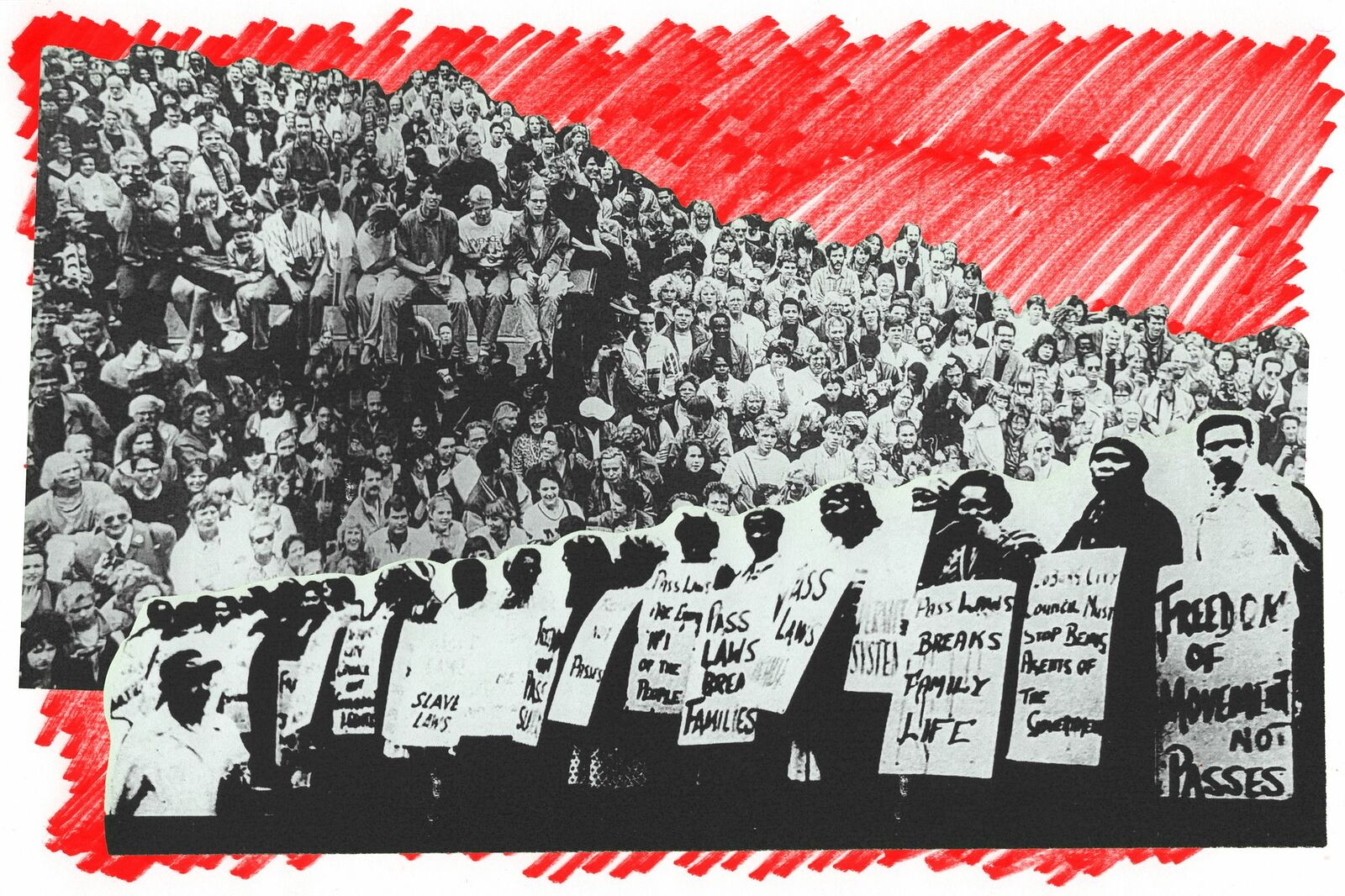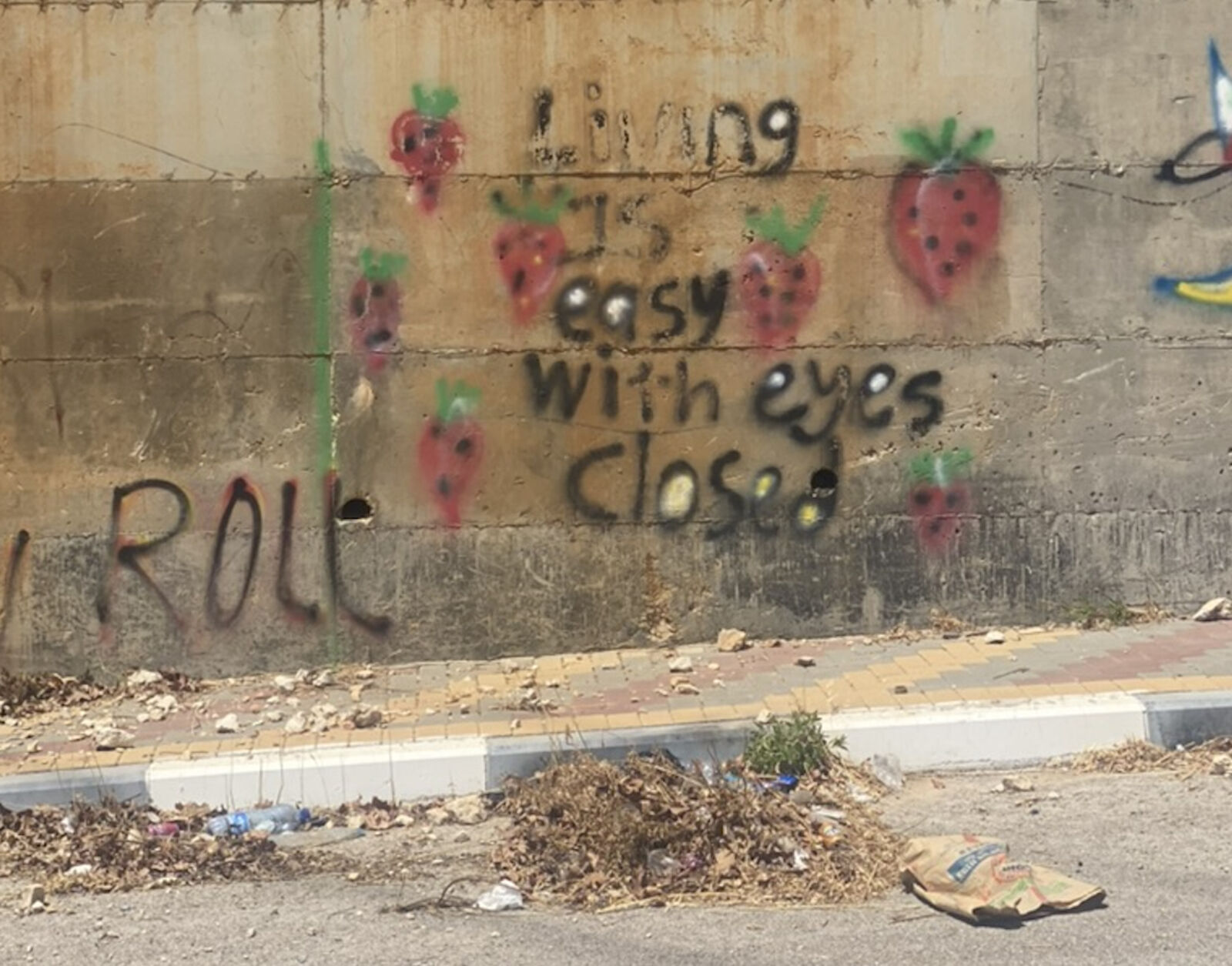Every Act of Struggle: Intrusion and Assembly
14:00–20:00
de Appel, Tolstraat 160, Amsterdam

Image: Bardhi Haliti & Zuzana Zuzana Kostelanská. Archief Anti-Apartheidsbeweging Nederland (Amsterdam), International Institute of Social History, Amsterdam
Over the past two years, a complex discourse has emerged concerning the ways in which cultural institutions in the Netherlands navigate questions of historical violence and systemic injustice in the context of their colonial history. Artists have employed various strategies to urge these institutions to address these issues, often merging activism with their artistic practice. While some actions have brought these matters to public attention, much of the discourse continues to unfold in private, with many institutions adopting cautious or noncommittal stances. This current dynamic recalls earlier moments in history, namely the debates sparked by the cultural boycott of South Africa and the anti-apartheid movement of the 1960s through the 1980s in the Netherlands, when cultural institutions faced similar pressures to critically reflect on their roles.
Adopting a methodology by School of Intrusions, the artists in this exhibition have been meeting in various archives and locations in Amsterdam, with each meeting or intrusion at a new site being led by a different artist. They look through research material, read texts collectively and discuss various cases of anti-apartheid campaigns, actions led by artist movements and institutional reactions. For the duration of the presentation at de Appel, new and former artworks by the artists Noor Abed, Simnikiwe Buhlungu, Chad Cordeiro, and Pieter Paul Pothoven will be exhibited. The exhibition space around the works will be converted into a hospitable assembly space by architect and artist Iswanto Hartono to host activations by sharing open research and study sessions with audiences. The research will continue past the exhibition culminating in another public moment in 2026.
The different meetings and research sessions lead to many open questions such as: What were the motivations for joining the anti-apartheid movements in the Netherlands? What was apartheid in South Africa and how is it similar to Israeli apartheid practiced in Palestine today? What tactics were adopted by anti-apartheid movements in the Netherlands? How important was cultural boycott at the time and what were the dynamics at play between cultural institutions and cultural workers/artists? Were visual artists active in the anti-apartheid movement? If so, how? How did cultural institutions respond to actions and cultural boycotts? What happened to the bravery of the seventies and eighties? Are the anti-apartheid tools and strategies that are employed today sufficient? And if not, what tools and strategies can be developed or co-opted in their place?
About the artworks
Iswanto Hartono, design of de Appel’s exhibition space
Iswanto Hartono converted de Appel into a space where different forms of assembly can take place, based on horizontal discussion practice and participation. Taking the design and structure of Fridskul in documenta fifteen — a space that served as a repository for shared resources, knowledge, stories, and experiences — as the starting point, Hartono designed a hospitable space allowing for the artworks to be interspersed within it, and for different public programmes to take place.
Noor Abed, Stars at Midday, 2024
Recording of book reading and images from the book
Stars at Midday –نجوم الضُهر is a personal production diary in which the artist and filmmaker Noor Abed compiles visual and poetic notes from the production phase of her film A Night We Held Between, filmed in Palestine in 2023 with family and friends. Like the film whose production it chronicles, the book interweaves narrative fragments, song and diaristic observations, creating a fusion of natural and composed sequences of movement, of documentary and fictional elements. The recording will be of a live reading and discussion at de Appel.
During the public programme Noor’s film A Night We Held Between (2024, 30”) will be presented. The film centres around a song found during her research at the sonic archive library of the Popular Art Center Palestine, in Ramallah, in the spring of 2023. Moving around a folk song, in a labyrinth of sounds and sites, the film connects mythology to a present socio-political reality in Palestine.
Simnikiwe Buhlungu, A Loooooong Ass Message, ya dig? (with readers), 2025
Installation
In this performative installation, an old fax machine delivers a message that spills over a stack of office boxes. This indirect presence of the faxers speaks to questions around lack of institutional access. The interruption of the art space’s telephone line to deliver faxes of “the content erased and re-erased by art institutions” points to the importance of inserting politicised work that speaks against this erasure. This rendition of the same work from 2018 will include readers-as-faxers/faxers-as-readers from Bethlehem, Palestine and Johannesburg, South Africa, namely Fairouz Hasan and Thuli Gamedze.
Chad Cordeiro, Sjambok library, 2024 – ongoing
Sjambok library is a modular and portable library which Chad Cordeiro has worked on during his time at the Rijksakademie van Beeldende Kunsten. While doing research in Johannesburg, Cordeiro came upon a story about artists who were making exhibitions which would travel in suitcases all over the world in solidarity with the anti-apartheid movement; one was supposed to travel to the Netherlands before the studio was raided and it was lost. Inspired by the story, Cordeiro developed a backpack which can turn into a table and bookshelf. The mobile library contains an ever-changing set of books about art in relation to the anti-apartheid movement. The library functions as a communal space, which travels and touches down in different localities.
Pieter Paul Pothoven, observatie contra observatie, 2020
Installation with spoken monologue (15”44’), FM-radio transmitter with antenna, radios, take-away posters
observatie contra observatie is part of a research project by Pieter Paul Pothoven for and in collaboration with the Revolutionary Anti-Racist Action (RARA). RARA is an anonymous collective that fought against racism, oppression and exploitation in the 1980s and 1990s against the legacies of the Netherlands' colonial past, which still persist today. observatie contra observatie is a spoken monologue; a dramatised account of events surrounding the first attack that was claimed by RARA and forced Makro to pull out of South Africa (see more: Harvests, Second meeting). Pothoven wrote the script for the character who speaks from the perspective of several of the activists involved, based on interviews and historical documents. The monologue is broadcast using a radio transmitter built by someone who was involved in RARA. The script is made available on take-away posters that also feature a photo of the wood-burning stove that RARA used not only for heating, but also for burning evidence. The project is in collaboration with Khadija El Kharraz Alami (voice actor), Liet Lenshoek (dramaturgy), Katrien de Klein (editing), De Slapende Hond (sound studio), and studioHendriksen (design poster).
Pieter Paul Pothoven, Notes – fragmented, incomplete – after Jan Wolkers (Boykot Outspan Aktie, 1978), 2025
Silkscreen posters, 68x68cm
The Dutch writer Jan Wolkers screen printed a poster in 1978 for the anti-apartheid organisation Boycot Outspan Aktie, which was founded by Esau du Plessis in 1970. The organisation campaigned for a boycott of Outspan fruit, especially oranges. The campaign was successful: within ten years, it was no longer possible to buy ‘blood oranges’ in Dutch supermarkets. For the work Notes – fragmented, incomplete – after Jan Wolkers (Boykot Outspan Aktie, 1978), Pothoven investigates the history of the poster, his own initial shock reaction and the way in which the poster resonates with the present. He will also present his research and questions around the poster during the public programme and receive feedback on its reception.
Henk Hokse and Albert Van der Weide, Zuid Afrika, 1977
Documentation of the performance at de Appel, on loop in the archive (ground floor)
In this performance, Van der Weide stood in the middle of the performance space and welcomed the visitors by offering them his hand, covered with black grease paint. When someone shook his hand — many refused to — the artist carefully painted his hand again, before allowing the next visitor to enter. This performance is based on a text by Steve Biko: 'The government gave us houses, we will not mention their quality. The government gave us medical care, we will not mention its quality. The government has split up our country, we will not mention the quality of this. However, the government has never deigned to shake us by the hand.'
Public Programme
Thursday 24 and Friday 25 April, 4-9pm: Opening Public Programme
Thursday 8 and Friday 9 May: Collective study in Times of Emergency with L’internationale Online
Sunday 11 May, 7.15pm: Film screening at Filmtheater Kriterion
Friday 23 and Saturday 24 May: Closing Public Programme
Sunday 25 May, 7.15pm: Film screening at Filmtheater Kriterion
Keep an eye on our website for updates and tickets!

